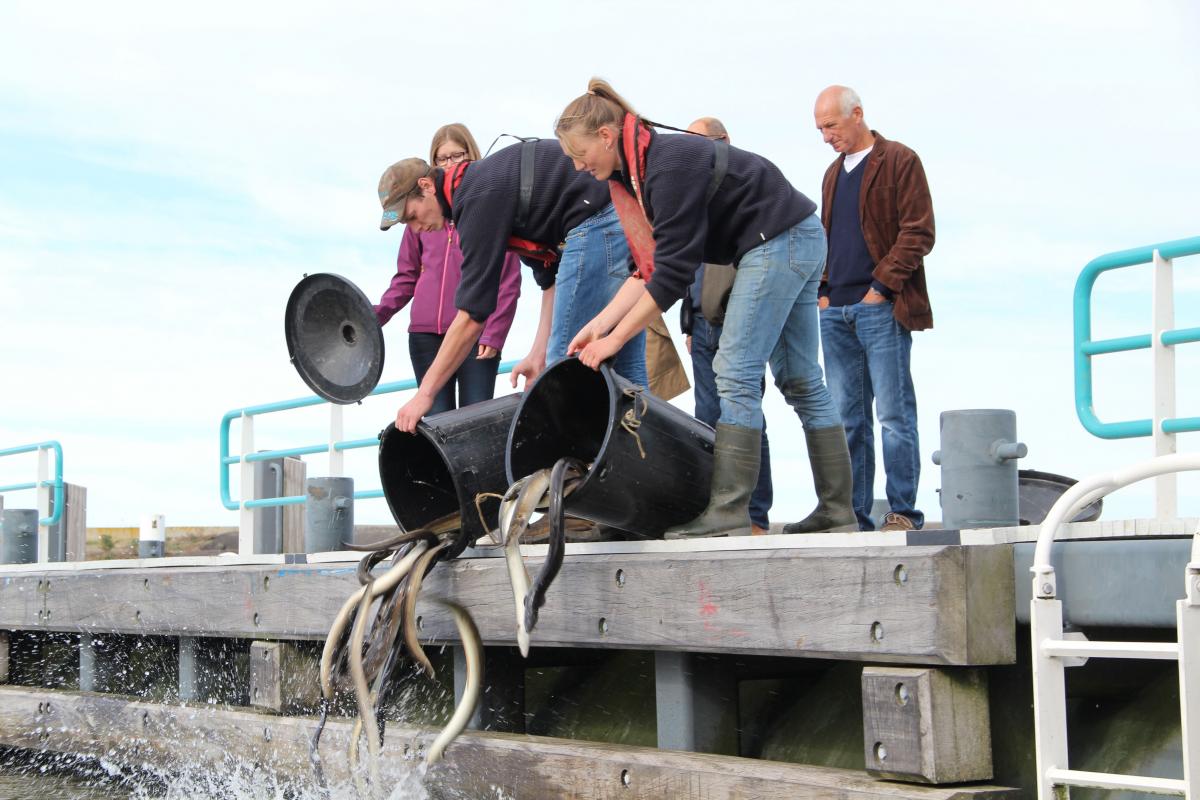
108 smugglers arrested and over 2 tonnes of glass eels seized in Europe
EUROPOL, 04 June 2020. On the occasion of the World Environment Day, which takes places tomorrow, Europol marks this day by promoting environmental action and its commitment to support EU Member States in tackling environmental crime. The annual Operation Lake aims to combat trafficking of endangered species in the EU and to dismantle violent organised crime groups involved in associated illegal activities, such as environmental crime, smuggling, money laundering, tax evasion and document counterfeiting.
The fourth edition of Operation Lake ran from October 2019 to April 2020 and Europol, the EU Wildlife / CITES Enforcement Group, EnviCrimeNet and the EU FOOD FRAUD network coordinated law enforcement authorities from 19 countries* across Europe. The result was the arrest of 108 suspected smugglers, the seizure of 2 013 kg of smuggled glass eels with an estimated value of €6.2 million. The rescued animals were reintroduced into their natural habitat to preserve this endangered species. This year’s operation became more challenging for the police officers as the fishing season took place during the COVID-19 lockdown in China. This made the links between the EU and the Asian country more complicated and had an impact on all transactions including illegal ones.
*Albania, Belgium, Bosnia and Herzegovina, Bulgaria, Czechia, France, Georgia, Germany, Italy, Latvia, Lithuania, the Netherlands, North Macedonia, Portugal, Serbia, Spain, Switzerland, Sweden and the United Kingdom.
6,560 actions in one week
The results of all the checks and investigations related to glass eels smuggling during the operation were enhanced by a joint action week in February with 6 560 actions taken in the fishing zone, ports, airports and roads – this led to the seizure of over 320kg smuggled species with an estimated value of €490 000.
Operational Highlights
- In France, the National Gendarmerie, French Customs and the French Central Office against Environmental and Public Health Crime (Gendarmerie nationale, Direction générale des douanes et droits indirects and Office français de la biodiversité) arrested 26 people involved in the smuggling of this species.
- In Italy, the Guardia di Finanza seized 550 kg of anguilla anguilla from October 2019 to April 2020. During the action week, as the national competent authority for customs controls on international trade in endangered species of wild fauna and flora (CITES), the Guardia di Finanza carried out coordinated checks within Italian airports and in other customs areas involved in the operation.
- The Portuguese Food Safety and Economic Authority (ASAE), the Tax and Customs Authority (Autoridade Tributária e Aduaneira), the Portuguese National Republican Guard (Guarda Nacional Republicana), the Public Security Police (PSP) and the Portuguese Maritime Police (Sistema de Autoridade Marítima) carried out dozens of arrests and seized hundreds of kilos of glass eels. The Portuguese Republican National Guard arrested 23 individuals and reported 62 suspects for the crime of damage against nature. Portuguese Customs made two seizures with around 200 kg. One of the most significant cases took place in Porto, Braga and Aveiro where the officers seized around 400kg of glass eels – worth it in €2 million. The Portuguese Maritime Police also dismantled two facilities: one dedicated to the production of illegal fishing equipment and another for the preparation and illicit transport of this species via air.
- The Swedish Customs Administration (Tullverket) carried out checks during the Joint Action Week and found 10kg of smoked eels in transit to Norway. The DNA tests in 5 out of 25 packages showed that these smoked glass eels were Japanese eels (anguilla japonica) and not anguilla anguilla, European glass eels.
- The Spanish Civil Guard SEPRONA (Guardia Civil) under the Europol’s coordination arrested 56 smugglers, reported 81 individuals and seized more than 722kg of glass eels. During the action week, the Spanish authorities carried out more than 2 000 actions.
- Different law enforcement authorities from the United Kingdom were involved in the operation by sharing intelligence with Europol. The National Wildlife Crime Unit, UK Border Force, Environment Agency, Centre for Environment Fisheries and Aquaculture Science and the Department of Agriculture, Environment and Rural Affairs from Northern Ireland met at the beginning of the season –which starts later than in southern Europe countries – to set out plans to target inspections in the UK.
Glass eel trafficking is one of the most devastating crimes against wildlife worldwide. Operation Lake is Europol’s flagship environmental crime operation, starting with just four countries in 2016, 15 new law enforcement authorities joined forces in 2020. The European eel population has decreased by 90% in recent years. Law enforcement activities against eel trafficking could be partly responsible for preventing the species from being wiped out.
This is the fourth time Europol experts on environmental crime have coordinated a hit against glass eel trafficking by holding coordination and operational meetings and providing analytical support and mobile office deployment to contribute to the success of the investigations in the countries involved.
Since 1974, every year on 5 June World Environment Day shines a light on environmental action and Europol is committed to supporting EU Member States in tackling environmental crime.
Environmental crime is one of the EMPACT priorities, Europol’s priority crime areas as part of the 2018–2021 EU Policy Cycle. This covers a range of activities that breach environmental legislation and cause significant harm or risk to the environment and/or human health.
Source: EUROPOL, click here to access original press release
The Sustainable Eel Group (SEG) is the leading international organisation seeking to accelerate the conservation and management of the European eel. SEG aims for healthy eel populations, distributed throughout their natural range, fulfilling their role in the aquatic environment and supporting sustainable use for the benefit of local economies. Key to this is the collaboration of the scientific, conservation and commercial sectors. SEG initiates and supports scientific research, conservation projects and organises stakeholders’ commitment. Additionally, it provides a standard for a responsible eel sector with traceability from source to market.


